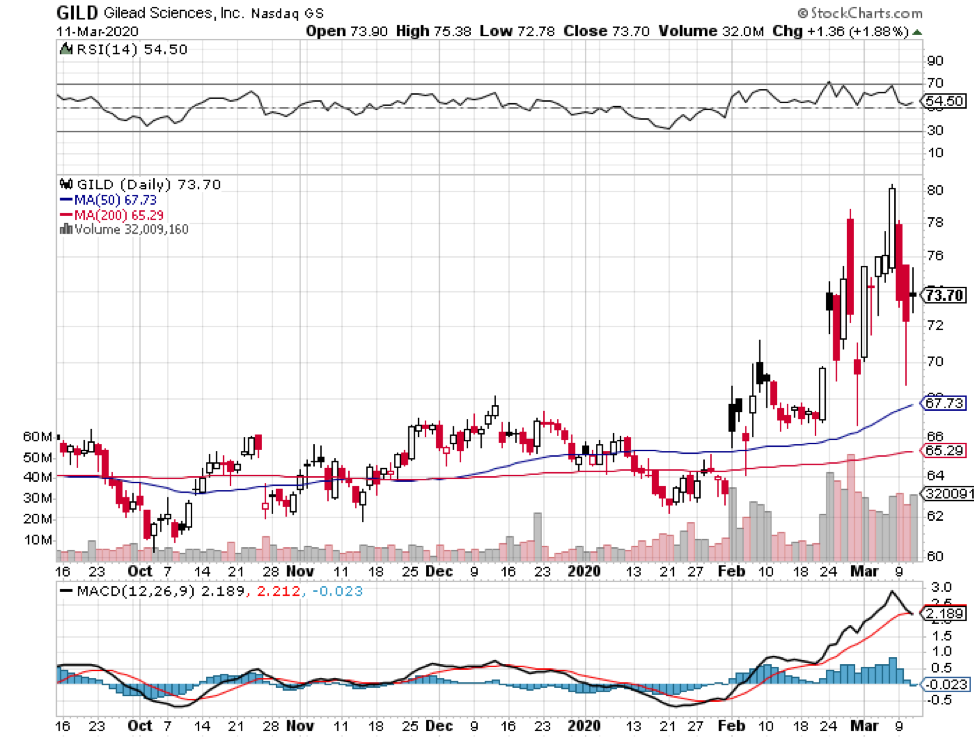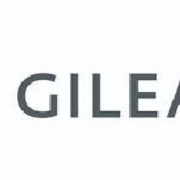Gilead Sciences' Corona Boom
The possibility of a pandemic is a terrifying thought. Nowadays though, you can’t switch on the news or surf the Internet without seeing reports about the worldwide spread of the coronavirus disease (COVID-19). Unfortunately, the fear that we once hoped to never be realized has become a reality.
The World Health Organization (WHO) has officially declared the coronavirus disease a pandemic.
The numbers are rising at an alarming speed, with over 1,300 confirmed cases in the United States alone and approximately 129,000 worldwide. As for the mortality rate, more than 4,700 people have died from this coronavirus disease.
Unsurprisingly, financial markets have taken a hit in recent weeks in response to the outbreak. The potential of an uncontrollable pandemic has wreaked havoc in the global economy instilling fear among investors.
With economists predicting that a full-scale pandemic could throw not only the US but also many developed countries into recession, the public has brace themselves for what lies ahead.
While a lot of companies are raking in profits enough to keep the wolf from the door, one biotechnology stock has been on a roll since the coronavirus outbreak went public: Gilead Sciences (GILD).
To date, Gilead has been hailed as possibly our best hope in discovering an effective treatment for the coronavirus.
Aside from being the first biotechnology stock to offer a solution to the outbreak, Gilead has another advantage over its rivals. It no longer has to start from scratch. Instead, the company reused Remdesivir, which is a drug it previously developed to cure Ebola but failed.
Basically, Remdesivir is designed as an antiviral drug that helps patients fight off viral infections. That means it targets not only the Ebola virus but also other types of viruses including SARS and MERS.
Since SARS and MERS are caused by the coronavirus as well, health experts believe that Remdesivir could be a treatment for COVID-19.
On January 31, doctors administered a dose of Remdesivir on a COVID-19 patient and discovered that the drug reversed almost all the major symptoms.
If Remdesivir proves to be the key to solving the COVID-19 outbreak, then Gilead will not only experience a massive performance boost but might even end up saving the world from a recession.
Despite this promising development, Gilead isn’t putting all its eggs in just one basket.
The company has recently made its first major purchase in three years in the form of a $4.9 billion acquisition of cancer biotechnology company Forty Seven (FTSV) — approximately twice as much as the latter’s market cap.
Gilead’s main draw for this huge deal is FTSV’s promising lead pipeline candidate Magrolimab, which is a treatment that targets various types of cancer such as myelodysplastic syndrome and acute myeloid leukemia.
What sets apart Magrolimab is that it targets CD47, which is typically called the “don’t eat me signal” molecule that cancer cells utilize to circumvent the immune system.
Although Magrolimab is still in its trial phase, the treatment showed a notable 40% response rate for hard-to-treat blood cancers and 50% for Myelodysplastic syndrome. The drug is also getting tested for lymphoma and ovarian, bladder, and colorectal cancers.
This latest deal is in line with some of Gilead’s biggest acquisitions in recent years like its $11.9 billion deal with cancer immunotherapy developer Kite Pharma in 2017.
Apart from these, Gilead has expanded its $5 billion partnership with Galapagos (GLPG) in the hopes of finally bringing another blockbuster in its lineup.
The two have been working on rheumatoid arthritis (RA) and Crohn's disease treatment Filgotinib, which has the potential to bring at least $1.3 billion in revenue in the next five years.
Once it hits the market, Magrolimab is expected to rake in $800 million to $1 billion in peak sales.
Although Gilead’s deal with Forty Seven has the highest price tag, it wasn’t the only acquisition of smaller immuno-oncology companies that happened recently. Merck (MRK) acquired AqQule for $2.7 billion while Sanofi (SNY) purchased Synthorx for $2.5 billion.
The COVID-19 pandemic has provided an unexpected opportunity for Gilead, and there’s no doubt that Remdesivir’s success will contribute to the company’s profits this year.
However, Gilead’s most promising growth driver is the rheumatoid arthritis lineup it’s developing with Galapagos. On top of these, it’s immuno-oncology pipeline is also shaping up to have some of the most exciting and promising candidates particularly for rare diseases.
The coronavirus pandemic has infused panic among the public, with more and more stocks getting dumped based on alarm and confusion. But as terrifying as this situation is, the best way to handle it is to remain calm and to put things in perspective.
Remember, solid companies will continuously achieve success in the long run no matter the temporary drawbacks in their stock prices. Buy those shares and simply hold on to them. Your future self will be grateful for that decision.
As fear continues to take over a lot of investors’ strategies, let me share with you one of my favorite pieces of advice from Warren Buffett: “Be fearful when others are greedy and be greedy when others are fearful.”



